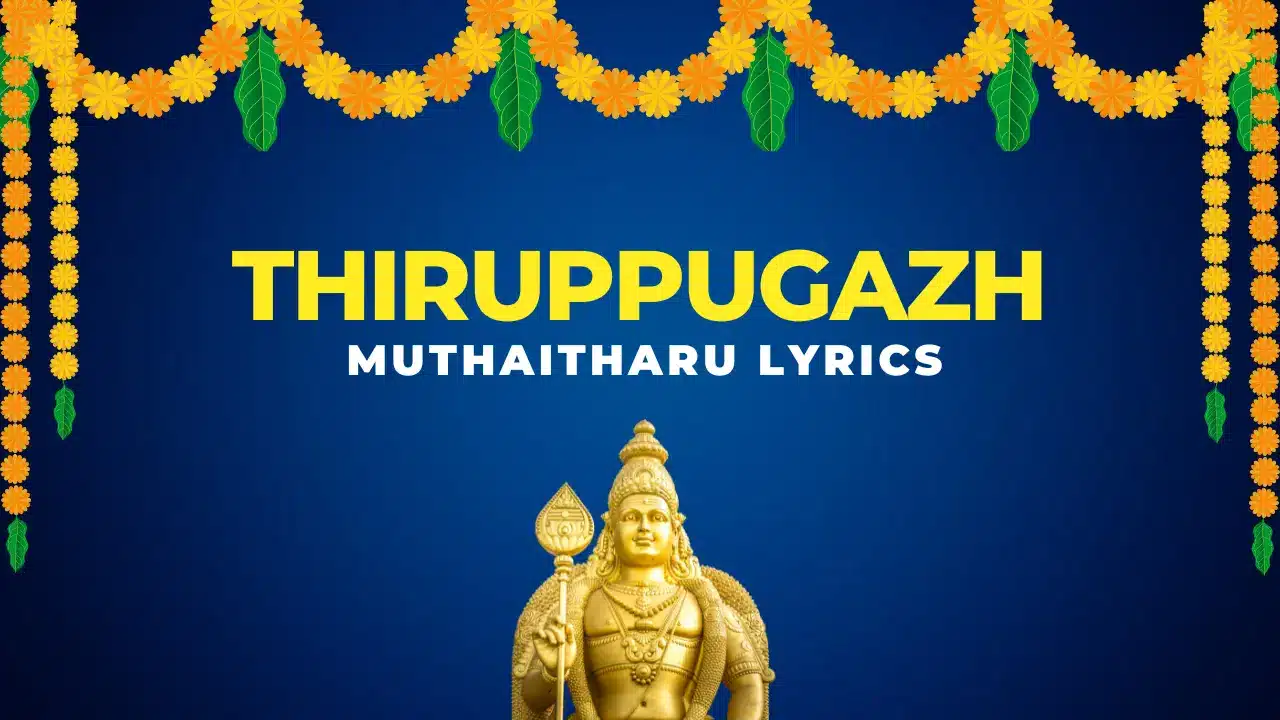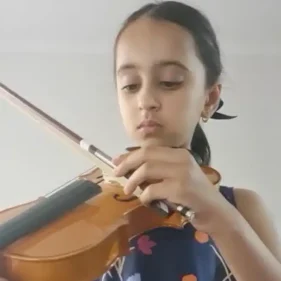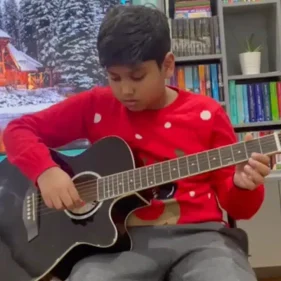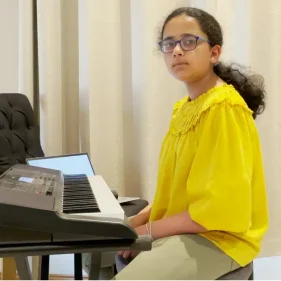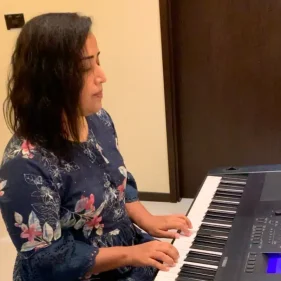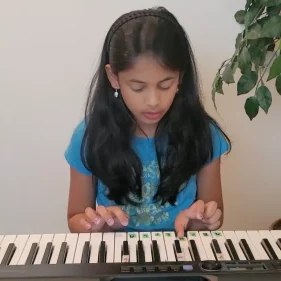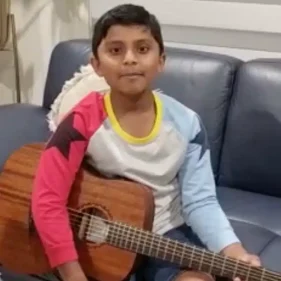Introduction
Thiruppugazh, written by Arunagirinadhar, is the most appreciated Tamil literature form when it comes to divine verses for Gods. It’s a lyrical text praising Lord Murugan. This blog has the notations for Thiruppugazh-Muthaitharu Lyrics. Thiruppugazh means, Divine Glory or Holy Praise. This comes under the form of an anthology, and it is one of the centralised pivot works from the Medieval Tamil Literature. The poetical and the musical qualities is strong and so is the moral, religious and philosophical meaning of the lyrics.

It’s in literature that true life can be found. It’s under the mask of fiction that you can tell the truth. Literature allows us to be open, to listen, and to be curious.
Arunagirinadhar
Arunagirinadhar, a saint-poet who lived in the 14th century, is said to have lived around, 1370 CE to 1450 CE. Complex rhythmic structures and rhyme schemes are his signature way of writing. He blends literature and divinity harmoniously. He was born in Thiruvannamalai, in a Senguntha Kaikolar Family.
Due to his unceremonious way of living, wasting money in debauchery, he had Leprosy, which was a contagious disease back then. People started avoiding him or going near him. His sister, who was regularly providing him money to fund his wayward life, ran out of money and this pushed Arunagirinadhar to have suicidal thoughts. His sister not able to bear the thought of her brother passing away, told him to sell her for money. That is when he realised his selfish way of living.
Not able to bear how selfish he was, he went to a temple and started banging his head on the steps, crying for forgiveness. He went on to even jump from the temple tower, but the legends say that Lord Murugan himself made an appearance in front of him, saved him from death. It is said that Murugan also cured him from leprosy and instilled the thought to create devotional songs which will benefit the mankind in the later future.
Thiruppugazh
Thiruppugazh is a compliation of information and praises of Lord Murugan and his story, collected from the six abodes of Murugan (Arupadai veedu). The verses sing mainly in praise of Lord Murugan but a few verses are about Lord Shiva and Goddess Parvati, the parents of Murugan. A few verses are about the avatars of Lord Vishnu as well. Thiruppugazh verses, in Arunagirinadhar’s own words, will convey pearls of wisdom and devotion.
The literature and poems from early medieval Tamil, followed a pattern of classical tamil Literature. But Thiruppugazh, on the contrary was written in a different form of Tamil. The rhythm structure of the verses also differed. Thiruppugazh is more rhythmical than the other classical meters used in the contemporary literature of the time.
Meaning of Thiruppugazh Muthaitharu Lyrics
Arunagirinadhar calls Murugan as the Lord of Devayani, his wife, and he tells that the Lord has pearl like teeth. He is holding the Shakthivel and hence the name Velavan is used, and through his Spear(Vel) he gives liberation to his devotees. Lord Murugan was a teacher for his father Lord Shiva himself, when he explained the meaning of Om. This was witnessed wonderstruck by Lord Brahma, Lord Visnhu and thirty three crores of Devas.
The second part of the song shifts mood, where it talks about the war that happened between Soorapadman and Lord Murugan. Kali, Bhairavas and Devaganangal were in dance in all the eight directions, giving all the necessary energy for Lord Murugan to win the war. All these are explained well through the rhythmic words and patterns across the lyrics.
Arunagirinadhar also talks about the victories and miracles of Lord Vishnu in various incarnations, and calls Lord Muruga the favourite of Lord Vishnu. Arunagirinadhar, implores Murugan, who has performed tremendous feat like that to come and protect him.

Did You Know?
It is a general saying that, whoever practises Thiruppugazh, their word diction becomes very clear.
Thirupugazh: Muthaitharu Lyrics
Composer: Arunagirinathar
Raga: Shanmugapriya
Aa: S R2 G2 M2 P D1 N2 Ṡ
Av: S N2 D1 P M2 G2 R2 Ṡ
Muthai Tharu Patthi Thirunagai
Atthikkirai Satthi Saravana
Mutthikkoru Vitthu Guru Para Ena Odhum (2)
Mukkat Para Marku Churuthiyin
Murpattadhu Karpith Thiruvarum
Muppatthu Muvargath Thamararum Adi Pena (2)
Patthu Thalai Thatthak Kanaithodu
Otrai Giri Matthaip Porudhoru
Pattap Pagal Vattath Thigiriyil Iravaaga (2)
Pattharkira Thatthaik Kadaviya
Pacchaippuyal Mecchath Thagu Porul
Patchatthodu Rakshith Tharulvadhum Oru Naale (2)
Thitthitheya Otthap Paripura
Nirttha Padham Vaitthup Bayiravi
Dikkotka Nadikkak Kazhugodu Kazhudhaada (2)
Dhikkup Pari Attap Bayiravar
Thokku Tthoku Thokkuth Thoku Thoku
Chithrappavurikkuth Thrigadaga Ena Odha (2)
Verse 1
| N | Ṡa | Ṡ | Ṡ | | | Ṡa | Ṡa | Ṡ | Ṡ | Ṡ | R | || |
| Mu | thai | tha | ru | | | pa | thi | thi | ru | na | gai | || |
| Ṙ | Ġa | Ġ | Ṡ | | | Ṡa | Ṡa | Ṡ | Ṡ | Ṡ | Ṡ | || |
| At | hik | ki | rai | | | sak | thi | sa | ra | va | na | || |
| N | Ṡa | N | D | | | Da | N | N | D | P | M | || |
| Mu | thi | kko | ru | | | vit | thu | gu | ru | pa | ra | || |
| P | Da | N | , | | | Ṡa | , | , | , | , | , | || |
| E | na | o | – | | | dhum | – | – | – | – | – | || |
Verse 2
| Ġa | Ġa | G | G | | | Ġa | Ġa | Ġ | Ṁ | Ġ | Ṙ | || |
| Muk | kat | pa | ra | | | mar | ku | chu | ru | thi | yin | || |
| Ṙe | Ṙe | Ṙ | Ṙ | | | Ṙ | Ṙ | Ṡ | Ġ | Ṙ | Ṡ | || |
| Mur | pat | tad | hu | | | kar | pith | thi | ru | va | rum | || |
| Ṡ N | Ne | N | N | | | Ṡa | Ṡa | N | Ṡ | N | D | || |
| Mup | pat | thu | mu | | | varg | ath | tha | ma | ra | rum | || |
| P | Da | N | ṘṠ | | | Ne | , | , | , | , | , | || |
| At | di | pe | n | | | a | – | – | – | – | – | || |
Verse 3
| Pa | Da | N | Ṡ | | | Ne | Ne | N | N | N | N | || |
| Pat | thu | tha | lai | | | that | thak | ka | nai | tho | du | || |
| Pa | Da | N | Ṙ | | | Ṡa | Ṡa | Ṡ | Ṡ | Ṡ | Ṡ | || |
| Ot | rai | gi | ri | | | mat | thai | po | ru | dho | ru | || |
| Ṡa | Ṙ | Ġ | Ṁ | | | Ġa | Ġa | Ṙ | Ġ | Ṙ | Ṡ | || |
| Pat | tap | pa | gal | | | vat | that | thi | ri | gi | ri | || |
| P | D | N Ṡ | ṘĠ | | | Ṙ | , | , | , | , | , | || |
| I | ra | va | – | | | ga | – | – | – | – | – | || |
Verse 4
| Ġa | Ġa | G | G | | | Ġa | Ġa | Ġ | Ṁ | Ġ | Ṙ | || |
| Pat | thar | ki | ra | | | that | thaik | ka | da | vi | ya | || |
| Ṙe | Ṙe | Ṙ | Ṙ | | | Ṙ | Ṙ | Ṡ | Ġ | Ṙ | Ṡ | || |
| pach | hai | pu | yal | | | mec | chath | tha | gu | po | rul | | |
| Ṡ N | Ne | N | N | | | Ṡa | Ṡa | N | Ṡ | N | D | || |
| Pat | chat | tho | du | | | rak | shith | tha | rul | va | dhum | || |
| P | DN | ṠṘ | Ġ | | | Ṡa | , | , | , | , | , | || |
| O | ru | na | – | | | le | – | – | – | – | – | || |
Verse 5
| Pa | Pa | P | P | | | pa | Pa | P | D | N | Ṡ | || |
| Thi | thi | the | ya | | | ott | hap | pa | ri | pu | ra | || |
| Ne | Ne | N | N | | | Ne | Ne | D | N | D | P | || |
| Nir | tha | pa | dham | | | vait | thup | ba | yi | ra | vi | || |
| Pa | Pa | P | M | | | Ga | Ga | R | G | R | G | || |
| Di | kk | ot | ka | | | nadd | ikkak | ka | zhu | go | du | || |
| S | R | SR | GM | | | Pa | , | , | , | , | , | || |
| Ka | zhu | dha | – | | | da | – | – | – | – | – | || |
Verse 6
| Pa | D | N | Ṙ | | | Ṡa | Ṡa | Ṡ | Ṡ | Ṡ | Ṡ | || |
| Dhi | kkap | pa | ri | | | att | ap | ba | yi | ra | var | || |
| Pa | Da | N | Ṡ | | | Ne | Ne | N | N | N | N | || |
| Thok | ku | ttho | ku | | | thok | kuth | tho | ku | tho | ku | || |
| Ga | Ma | P | N | | | Da | Da | P | D | P | M | || |
| chi | thr | app | avu | | | rik | kuth | thi | ri | gad | aga | || |
| P | Da | Ne | , | | | Ṡ | – | – | – | – | – | || |
| E | na | o | – | | | dha | – | – | – | – | – | || |
Verse 7
| Ne | Ṡa | N | Ṙ | | | Ṡa | Ṡa | Ṡ | Ṡ | Ṡ | Ṡ | || |
| Kot | thup | pa | rai | | | kot | tak | ka | la | mi | sai | || |
| Ne | Ṡa | N | Ṙ | | | Ṙe | Ṙe | Ṙ | Ṙ | Ṙ | Ṙ | || |
| kuk | kuk | uku | kuku | | | ku | ku | ku | ku | ku | ku | || |
| Ne | Ṡa | N | Ġ | | | Ġa | Ġa | Ṙ | Ġ | Ṙ | Ṡ | || |
| Kut | thip | pu | dhai | | | puk | ku | pi | di | ye | na | || |
| P | D | NṠ | Ṙ Ġ | | | Ṙe | , | , | , | , | , | || |
| Mu | dhu | ko | – | | | gai | – | – | – | – | – | || |
Verse 8
| Ġa | Ġa | Ġ | Ġ | | | Ġa | Ġa | Ġ | Ġ | Ġ | Ṁ | || |
| Kot | pu | tre | zha | | | nat | patr | ar | u | na | rai | | |
| Ṙe | Ṙe | Ṙ | Ṙ | | | Ṙe | Ṙe | Ṡ | Ġ | Ṙ | Ṡ | || |
| Vet | ti | ba | li | | | yit | tuk | ku | la | gi | ri | || |
| ṠN | Ne | N | N | | | Ṡa | Ṡa | N | Ṡ | N | D | || |
| ku | tt | hu | p | | | ott | hup | po | ra | va | la | || |
| P | Da | Ne | , | | | Ṡa | , | , | , | , | , | || |
| Pe | ru | ma | a | | | le | – | – | – | – | – | || |
Shanmugapriya, the Raagam in which Thiruppugazh Muthaitharu lyrics were composed in, is said to be a favourite Raagam, among the Carnatic enthusiasts.
FAQs
What is the meaning of Thiruppugazh?
The meaning of Thiruppugazh is Divine Glory or Holy Praise.
Who wrote Muthaitharu, Thiruppugazh?
Arunagirinadhar is the poet of Thiruppugazh.
Where can I see the notes and notations of Muthaitharu?
The blog above has the notes and notations of Muthaitharu.
In which raagam is Muthaitharu composed in?
Muthaitharu is composed in the Raagam Shanmugapriya.
Where can I listen to Muthaitharu?
There are various artists in Youtube who has rendered Muthaitharu, a few prominent artists being M.S.Subbulakshmi, Nithyashree and Sooryagayathri.
Related blog: Era Napai Varnam | Thodi Raagam

